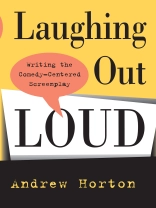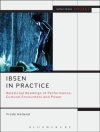Whoever wrote ‘Make ‘em laugh!’ knew that it’s easier said than done. But people love to laugh, and good comedy will always sell. With the help of this complete and entertaining guide, writers and would-be writers for film and television can look forward to writing comedy that goes far beyond stereotypic jokes and characters. In Laughing Out Loud, award-winning screenwriter and author Andrew Horton blends history, theory, and analysis of comedy with invaluable advice.
Using examples from Chaplin to Seinfeld, Aristophanes to Woody Allen, Horton describes comedy as a perspective rather than merely as a genre and then goes on to identify the essential elements of comedy. His lively overview of comedy’s history traces its two main branches—anarchistic comedy and romantic comedy—from ancient Greece through contemporary Hollywood, by way of commedia dell’arte, vaudeville, and silent movies. Television and international cinema are included in Horton’s analysis, which leads into an up-close review of the comedy chemistry in a number of specific films and television shows.
The rest of the book is a practical guide to writing feature comedy and episodic TV comedy, complete with schedules and exercises designed to unblock any writer’s comic potential. The appendices offer tips on networking, marketing, and even producing comedies, and are followed by a list of recommended comedies and a bibliography.
Whoever wrote ‘Make ‘em laugh!’ knew that it’s easier said than done. But people love to laugh, and good comedy will always sell. With the help of this complete and entertaining guide, writers and would-be writers for film and television can look forward
Tabla de materias
Acknowledgments
Introduction
PART I
Comic Elements and Exercises
1 Elements of Comedy That Writers Should Know
2 Exercises to Nurture the Comic Muse
PART II
A Writer’s Overview of the Traditions and Genres of Comedy
3 From Stage and Page to Screen: Anarchistic
and Romantic Comedy
4 Physical Humor: From Commedia dell’Arte
and Moliere to Vaudeville and Silent Screen Comedy
5 Sound Comedy: American Screwball Romantic Comedy,
Then and Now
6 Comedy and Television: Stand-up, Sitcom and Everything
in Between
7 Comedies from around the World
8 Comedy and the Documentary Impulse
PART III
Close-ups on Comedies
9 Feature Film Comedies
10 Television Comedy: Seinfeld and The Simpsons
PART IV
Writing Comedy
11 The Fifteen-Week Feature Comedy Screenplay
12 The Seven-Week Half-Hour Television Comedy
Pilot Script
Beyond Happy Endings: Toward a Comic Conclusion
Appendix 1 A Recommended Viewing List
of American and Foreign Feature Comedies
Appendix 2 Networking, Marketing and Making
Your Own Comedy
Appendix 3 Food, Recipes and Comic Screenwriting
Bibliography
Index
Sobre el autor
Andrew Horton, the Jeanne H. Smith Professor of Film and Video Studies at the University of Oklahoma, is author of the popular Writing the Character-Centered Screenplay (California, 1994) and other books. Most recently he coedited Play It Again Sam: Retakes on Remakes (with Stuart Mc Dougal, California, 1998) and wrote the introduction to Three More Screenplays by Preston Sturges (California, 1998).












